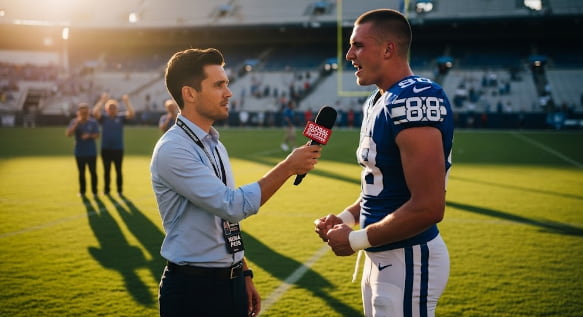Want to know how to become a sports journalist? Here’s what you need to do: get a journalism degree, learn to write fast and well, cover local games to build your clips, and network with people in the business.
Most people need about 3-5 years to get their foot in the door, starting small and working up. While it’s competitive, many people do succeed with the right approach.
This guide shows you exactly what it takes to turn your love of sports into real paychecks.
Essential Skills And Qualifications For Sports Journalism
Your passion for sports is the starting point, but you’ll need specific skills to land paying jobs in this field. Here are the core skills that will help you
Core Skills Needed:
- Excellent writing and storytelling abilities: Write stories people want to read, turn boring game recaps into something interesting.
- Strong communication and interviewing skills: Talk to anyone without being awkward, get athletes to tell you things they don’t tell everyone else.
- Sports knowledge across multiple disciplines: Know different sports pretty well; you might cover basketball Monday and baseball Tuesday.
- Digital media proficiency (social media, video editing, podcasting): Use social media and make videos. It’s 2025, and these digital tools are becoming standard in the industry.
- Ability to work under tight deadlines: Work fast when pressure’s on – Games end, fans want news, and you have 20 minutes to write.
This breakdown helps show what skills matter most these days:
| Traditional Skills | Digital Age Skills | Soft Skills |
|---|---|---|
| Writing & Editing | Social Media | Networking |
| Interviewing | Video Making | Being Flexible |
| Research | Data Analysis | Time Management |
| Beat Reporting | SEO | Critical Thinking |
The job changed a lot. You can’t just write anymore. Now you film interviews, post on Instagram, maybe start a podcast. It sounds like too much, but learn one thing at a time.

Your sports journalism journey offers unique rewards, demanding dedication, and constant skill. Education helps, but it isn’t the only way. Let’s explore your options to make your mark.
Education And Degree Requirements For Sports Journalists
Short answer: It helps, but it’s not the only way. Let’s break this down.
Degree Options:
1. Journalism or Communications (Most Common)
A sports journalism degree is the safe bet. You’ll learn basics, meet people, and have something good on your resume. Most big newspapers and TV stations still want to see this.
2. Sports Management With a Journalism Minor
Sports Management with some writing classes works too. You’ll understand the business side, which helps when covering trades and contracts.
3. English or Liberal Arts With a Sports Focus
An English or any Liberal Arts degree can work if you write well. Add sports knowledge and work hard, and you’re good to go.
4. Alternative Paths Without Traditional Degrees
But here’s something cool – some great sports writers never went to journalism school. They started blogs, built fans, and showed they could do the work. It’s harder, but totally possible.
Key Coursework:
- Media writing and reporting: Media writing teaches you to write fast and tight. This matters when you have 200 words and 10 minutes.
- Sports history and analytics: Sports history and stats give you background. Knowing why something matters helps you write better stories.
- Digital media production: Digital skills are huge now. Most places want you to make content for YouTube, TikTok, and podcasts.
- Ethics in journalism: Ethics classes might not sound exciting, but sports writing can get messy. You’ll face tricky situations where doing the right thing matters.
Sports Journalism Career Paths and Requirements:
| Career Path | Typical Education | Key Skills | Entry Level Salary Range |
|---|---|---|---|
| Print Reporter | Journalism Degree | Writing, Research | $35,000-$50,000 |
| Broadcast Reporter | Communications | Being on Camera | $40,000-$55,000 |
| Digital Content Creator | Any Degree + Digital Skills | Social Media, Video | $30,000-$45,000 |
| Sports Analyst | Sports Knowledge | Stats, Commentary | $45,000-$70,000 |
Each path has good and bad parts. TV looks cool until you’re standing in the rain at 6 AM waiting for a coach who might not show up. Digital content pays less at first, but you control your own career more.
Breaking into sports journalism today requires more than just a love for the game, it demands strong research skills, an eye for storytelling, and an understanding of the evolving digital sports landscape. If you’re looking for a platform that tracks India’s growing sports ecosystem, covers emerging athletes, and spotlights rising opportunities in media and reporting, be sure to visit SportsBoardIndia.com for expert insights and resources. It’s a great starting point for aspiring sports journalists building their presence in the Indian sports industry.
How To Become a Sports Journalist: Step-By-Step
Ready to stop dreaming and start doing? Here’s your plan.
Step 1: Build Your Foundation
Write about sports every day. Cover games, talk about trades, interview local coaches. Read everything – good sports writing and bad sports writing. Figure out what works. ESPN, The Athletic, and your local paper all do things differently. Learn from all of them.
Step 2: Create a Portfolio
Make a simple website with your best work. Start a sports blog if you want, but keep it professional. Contact your school paper or local websites. Write for free at first – it’s not ideal, but most people start this way to build experience. Five great stories beat twenty okay ones.
Step 3: Gain Real Experience
Cover high school games. Help at college sports events. Apply for internships everywhere – newspapers, radio, team websites. Even unpaid internships teach you how newsrooms work and help you meet people who can help later.
Step 4: Network Actively
Go to games and talk to other reporters. Follow sports writers on Twitter and actually talk to them (don’t just hit like). Join professional groups if you can afford it. One good connection can change everything.
Step 5: Apply Strategically
Don’t just send your resume everywhere. Learn about each place, know their style, and explain why you’d fit. Start small – local papers, team websites, sports blogs. Everyone wants to cover the Lakers, but someone needs to cover high school basketball, too.

This takes patience and persistence. Some talented people get discouraged after six months when they expect quick results, but building a career takes time.
Sports Journalism Salary And Job Market In 2025
Let’s talk about money because everyone wonders, but nobody asks.
What You Can Make
- Entry level: $35,000-$55,000 if you get a full-time job (that’s pretty hard to do).
- Mid-career: $50,000-$80,000 if you’re good and catch some breaks.
- Senior positions: $80,000-$150,000+, but that’s major markets and big names only.
- Freelancing: $50-$500 per story, depends on who’s buying.
Job Market Reality
- Getting full-time work is challenging since these positions are in high demand.
- Digital media made new chances, but also more people are willing to work for less.
- You need to do everything now – write, film, edit, post on social media.
- Local and smaller sports give you better chances than trying to cover the NFL right away.
- The business keeps evolving, so staying curious and adaptable is important.
In India, people like Boria Majumdar and Harsha Bhogle made it by being really good and using new platforms. In the US and Europe, the best sports writers mix old-school reporting with digital smarts.
Also Read:
Conclusion: Your Sports Journalist Journey Demands Relentless Skill And Persistence
How to become a sports journalist comes down to this: get some education (a degree helps but isn’t everything), write about sports every day, start covering local teams, and meet people already doing the job.
Plan on 3-5 years to really get going. It’s competitive, but if you can write well, adapt to new technology, and stay persistent through rejection, there are opportunities for you.
Stop reading about it and start writing about sports today.
FAQs
Yes, but it’s harder. You need to show you can do the work with a strong portfolio and work twice as hard for chances.
Most people spend 3-7 years building experience and reputation, starting local and working toward bigger outlets and better assignments.
Journalism is mostly writing and research. Broadcasting means you’re on TV or radio, doing live commentary and needing good on-camera skills.
Depends on your job. Big outlets pay for travel to cover major teams. Local reporters usually stay closer to home.
Social media means you need video skills, talk directly to fans, and create content instantly. It’s also how many people build careers now.

Anuj is a renowned linguist and grammarian with over 3 years of experience in teaching and researching the English language. He holds a PhD in English Language and Linguistics from Delhi University, and is the author of several highly acclaimed books on grammar and usage.